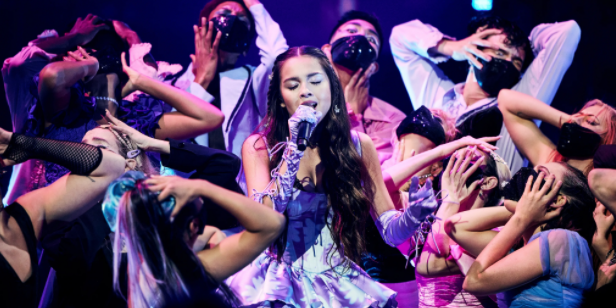Olivia Rodrigo: A Look at Everything Wrong in the Music Industry
October 22, 2021
To start things off— Olivia Rodrigo is not at fault. It is rather the incessant pandemonium surrounding her that informs the industry’s faults.
Rodrigo, age 18, first came into the spotlight in 2015, starring in Disney Channel’s Bizaardvark show. Since then, she has become a common name among teens, starring once more in the show High School Musical: The Musical: The Series, and boasting over 50 million monthly streamers on Spotify. For someone fresh out of high school, you could say that she is doing quite well for herself.
So what’s the issue? Isn’t everyone supportive of a young woman achieving mass success and fame following various TV stints and a debut album? Don’t we, as a society, like to see people happy? Maybe in an idyllic pipe dream. Reality, however, differs.
Of course, she has fans—lots of them. While I personally do not typically listen to her, I can appreciate her role in music and am certainly in her corner. But for her large audience, consisting predominantly of teenage girls, Rodrigo has become a staple over the past year or so, striking a chord (no pun intended) with her relatable lyrics about teenage life and heartbreak.
There is a natural backlash to be expected here, as society hates all that teen girls enjoy. People on the internet claiming to hate pop music without real reason surely had lots to say about a young woman of color meeting more success within a few months or years than they will likely see in their entire lives. There is always some internet it-girl for the masses to hate, a phenomenon that doubles as a long-time staple of pop culture. Before, it’s been Charli D’Amelio, Emma Chamberlin, even Taylor Swift. Next, it’ll be anyone else daring to make a name for herself.
What is not quite so normal is the response of other music industry titans, staples of pop culture seemingly ganging up against a teenager and making her break.
Over the summer, negative attention against Rodrigo peaked with accusations of plagiarism. The aforementioned Taylor Swift and Paramore’s Hayley Williams and Joshua Farro have all received retroactive songwriting credits for various songs on Rodrigo’s debut album SOUR, already costing Rodrigo millions of dollars in revenue. Swift in particular is repeatedly cited by Rodrigo herself as an inspiration and role model. What is interesting about this credit is the time gap between the album’s release date and the credit adjustments. SOUR came out in late May 2021 to immediate popularity, all of its singles trending before the album’s release. But it was not until July, in Swift’s case, or late August, for Paramore, that changes were made. The change was not unprompted, as SOUR’s cultural presence lends itself for extensive monetary gain. It would not be unlikely that Swift and Paramore, or at least their respective management companies, saw this as an opportunity to make some extra money without actually having to contribute anything.
If big names like Olivia Rodrigo can lose out to this extent based on business decisions made in hindsight, one can assume that this shift in the industry will harm smaller artists on an exponentially worse level. Art is an expansion of all that comes before it; to create in a vacuum is impossible and there is inherent likeness from simply participating in society. Elvis Costello, a prominent new wave musician, with famed songs including “Radio, Radio” and “Pump it Up” describes music as taking “the broken pieces of another thrill and [making] a brand new toy” after being asked his opinions over Rodrigo’s plagiarism claims. This similarity is a staple of any creation, but what will become of art if it is scrutinized to a larger scale in this manner?
